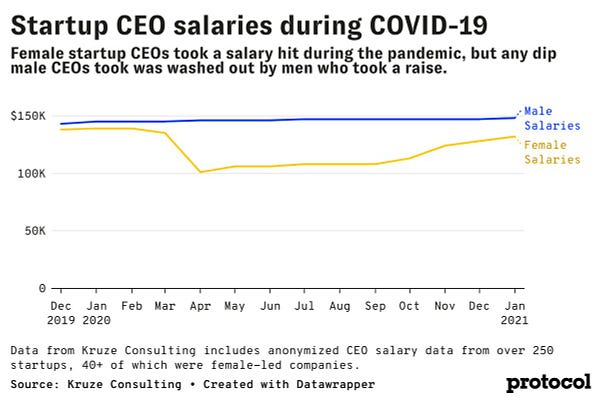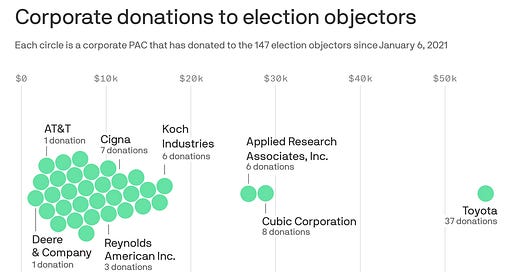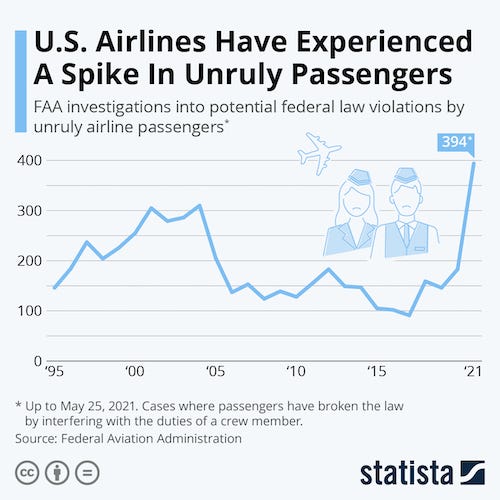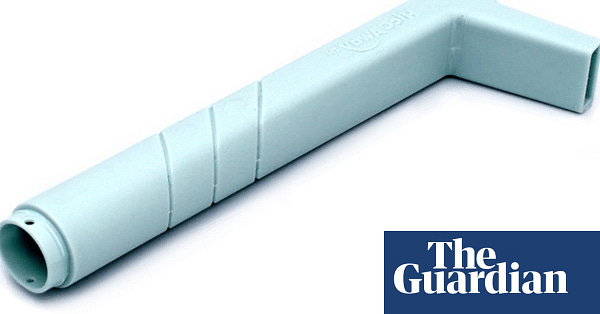Today’s posts that caught my eye:
“Work from home” is the new tactic in the fight for talent: UBS plans to allow up to two-thirds of its staff to mix working from home and the office on a permanent basis, the FT reports. The key line: UBS is betting “the approach will give the Swiss lender an edge over Wall Street banks in recruiting.”
I spoke recently with Walter Isaacson about his newest book, “The Code Breaker: Jennifer Doudna, Gene Editing, and the Future of the Human Race.” Today’s CRISPR news — successfully treating the first patients inside the body to an internal organ — is just another example of how extraordinary and world-changing it already is.
It’s shaping up to be quite an election next year in France.
Subscribers support the creation of the newsletter, podcasts & live events.
The World
China’s strengths as a cyber power are being undermined by poor security and weak intelligence analysis,according to new research that predicts Beijing will be unable to match US cyber capabilities for at least a decade. China, like Russia, has proven expertise in offensive cyber operations — conducting online spying, intellectual property theft and disinformation campaigns against the US and its allies. But both countries were held back by comparatively loose cyber security compared with their competitors, according to the IISS. As a result, only the US is ranked as a “top tier” cyber power by the think-tank, with China, Russia, the UK, Australia, Canada, France and Israel in the second tier. The third tier comprises India, Indonesia, Japan, Malaysia, North Korea, Iran and Vietnam. (Financial Times, International Institute for Strategic Studies)
Centre-right and leftwing politicians won convincing victories in the final round of France’s regional elections on Sunday, brushing off an attempt by Marine Le Pen’s far-right Rassemblement National to win its first region and confirming the weakness of President Emmanuel Macron’s governing party La République en Marche. (Financial Times)
Sweden’s prime minister, Stefan Löfven, announced he is resigning after losing a confidence vote last week, as he called on the country’s parliament to try to form a new government instead of holding an early election. Löfven, who has been prime minister since 2014 and heads the Social Democratic party, became the first Swedish leader to lose a confidence vote in parliament. (The Guardian)
In a major milestone for the still-young field of genome editing, Intellia Therapeutics said that the first six patients to receive a CRISPR-based treatment for a genetic nerve disorder have safely had the DNA inside their liver cells edited — successfully treating the first patients inside the body to an internal organ. The early trial data from the firm , co-founded by Nobel Prize winner Jennifer Doudna, marked a breakthrough for Crispr-based treatments, showing scientists had overcome challenges that had previously restricted the technology’s use to editing cells outside the body or in the eye. The Boston-based start-up, working with biotech company Regeneron, treated transthyretin amyloidosis, a devastating disease in which a build-up of a problematic protein hits a patient’s heart and nervous system, cutting their life expectancy. (Financial Times, STAT News)
The vaccines made by Pfizer-BioNTech and Moderna set off a persistent immune reaction in the body that may protect against the coronavirus for years, scientists reported. The findings add to growing evidence that most people immunized with the mRNA vaccines may not need boosters, so long as the virus and its variants do not evolve much beyond their current forms — which is not guaranteed. People who recovered from Covid-19 before being vaccinated may not need boosters even if the virus does make a significant transformation. (New York Times)
Hong Kong will put Britain back on its list of “extremely high-risk” countries and ban incoming travelers from July 1 in a bid to keep out Covid-19 variants. The suspension means anyone who has stayed in the UK for more than two hours during the past 21 days cannot enter Hong Kong. (South China Morning Post)
Nearly three-dozen corporate PACs have donated at least $5,000 to Republicans who objected to certifying the 2020 election, yet Toyota leads by a substantial margin. The new numbers suggest some large companies have decided to maintain support — even for members of Congress deeply enmeshed in the pro-Trump conspiracy theories that fueled the Capitol attack. Data compiled by the left-leaning watchdog group Citizens for Responsibility and Ethics in Washington show Toyota gave $55,000 to 37 GOP objectors this year. (Axios)
The latest obstacle hitting global shipping is likely to jolt trade flows for several more weeks and could delay shipments heading into the year-end holiday shopping season. Shipping executives say around 50 container ships remain backed up around the Yantian port in Southern China and that some 350,000 loaded containers are stacked up on docks as the major gateway for China goods heading to Western nations struggles to recover from a Covid-19 outbreak that disrupted operations. (Wall Street Journal)
In a recent study, socioeconomic disparities, lower income and education, have been correlated with poor respiratory health for the past 60 years. The study shows that despite the fact that air quality has improved and smoking rates have dropped in the past 60 years, disparities in respiratory health have not only persisted but grown wider. For example, between 1971-1975, 63% of adults in the top fifth of income scale were current/former smokers compared to 56% in the bottom fifth. Only 26% of those in the highest income reported shortness of breath while 44.5% in the bottom income reported shortness of breath. In 2017-2018, 34% in the top income were current/former smokers while 58% were in the bottom fifth. Of those numbers 28% in the highest income bracket experienced shortness of breath while 48% in the lowest income bracket experienced shortness of breath. (Journalists Resource)
The most severe heat wave in the history of the Pacific Northwest is nearing its climax. The National Weather Service had predicted it would be “historic, dangerous, prolonged and unprecedented,” and it is living up to its billing as it rewrites the record books. Portland soared to its highest temperature in more than 80 years of record-keeping: 112 degrees. This new mark occurred just one day after hitting 108, which had broken the previous all-time record of 107. Seattle surged to 104 degrees Sunday, surpassing the old record of 103. (Washington Post, Portland Oregonian)


Economy
During Covid-19, most Americans got richer — especially the rich: U.S. households added $13.5 trillion in wealth last year, according to the Federal Reserve, the biggest increase in records going back three decades. Many Americans of all stripes paid off credit-card debt, saved more and refinanced into cheaper mortgages. That challenged the conventions of previous economic downturns. In 2008, for example, U.S. households lost $8 trillion. (Wall Street Journal)
Wells Fargo estimates $2.4 trillion in excess savings has been accumulated by consumers since the beginning of the pandemic. And consumer spending accounts for about 68% of GDP. Wells Fargo’s Tim Quinlan: “This is equivalent to 15-20% of typical annual consumption and is an ample amount of dry powder consumers are able to tap as the economy re-opens.” (Axios)
UBS plans to allow up to two-thirds of its staff to mix working from home and the office on a permanent basis, betting the approach will give the Swiss lender an edge over Wall Street banks in recruiting. The move to embrace a hybrid working model has been led by chief executive Ralph Hamers and his top managers, and underlines the growing gulf with the more hardline approach adopted by many US banks. (Financial Times)
Demand for CLO deals is so hot that Wall Street can’t keep up: Wall Street is packaging leveraged loans into bonds at a record pace, stretching bankers, lawyers and debt graders to the limit while showing no signs of slowing. Lawyers say they're pulling all-nighters to keep up with the flood of documents needed to offer the securities to investors. (Bloomberg)
Cryptocurrency experts say these 4 factors are driving change in the industry: 1) Mainstream adoption; 2) Price volatility; 3) Regulatory pressure; 4) Beyond Bitcoin. (Crunchbase)
Amazon and other tech giants are racing to buy up renewable energy. The race to secure electricity deals for power-hungry data centers has tech companies reshaping the renewable-energy market and grappling with a new challenge: how to ensure their investments actually reduce emissions. (Wall Street Journal)
Technology
Female startup CEOs took a 30% pay cut during COVID-19. The same didn't happen for men. (Protocol)


Katie Haun, who created the first federal cryptocurrency task force as a prosecutor in the Justice Department, will co-chair the $2.2 billion crypto fund Andreessen Horowitz announced last week. She spoke to the New York Times about the outlook for the burgeoning industry, the geopolitics of blockchain, risk, regulation and the fund’s focus. (New York Times)
Salesforce and Zendesk expressed concern about Facebook’s $1 billion acquisition of a smaller CRM firm to F.T.C. lawyers reviewing the deal, according to people with direct knowledge of the matter. That’s one reason the proposed acquisition, which just a few years ago would have been waved through, is now in its seventh month of a U.S. antitrust review. (The Information)
Republicans' new plan to tax Big Tech: An idea from GOP FCC commissioner Brendan Carr to force tech companies to pay into a pool of money used to fund broadband programs is gaining steam with some key lawmakers. GOP Minority Leader Kevin McCarthy called the proposal "thought-provoking," and his office notes that video streaming accounts for more than 50% of web traffic and online advertising is a $100 billion a year industry. (Axios)
Smart Links
North Korea sees 'propaganda value' in slimmer Kim, analysts say. (Reuters)
Why some biologists and ecologists think social media is a risk to humanity. (Recode)
Stretched global supply chain means shortages on summer menus. (Reuters)
Investors pile $54bn in to ESG bond funds in fiery start to 2021. (Financial Times)
Robinhood’s IPO plans slowed by SEC review. (Bloomberg)
Novel smart cement can be used to build more durable roads and cities. (Northwestern University)
McDonald’s loyalty program goes national. (Wall Street Journal)
How journalists’ preference for round numbers can influence elections. (Stanford Business School)
U.S. airlines have experienced a spike in unruly passengers. (Statista)
Good News
Bruce Springsteen returned to Broadway on Saturday night, reviving a show for an audience that included a member of his E Street Band and the governor of New Jersey. Springsteen was clearly emotional. He wiped away tears toward the end of the show, which mixes remembrances with performances. Thrilled to be back, fans cheered Springsteen’s words so often he had to tell them to settle down, lest the show take all night. His longtime guitarist, Steven Van Zandt, received a standing ovation when he took a seat in the audience. New Jersey governor Phil Murphy and US transportation secretary Pete Buttigieg were also there. (The Guardian)


Drinking straw device is instant cure for hiccups, say scientists. Sipping water through an L-shaped ‘suction and swallow tool’ cured 92% of attacks, according to study. (The Guardian)
Subscribers support the creation of the newsletter, podcasts & live events.







